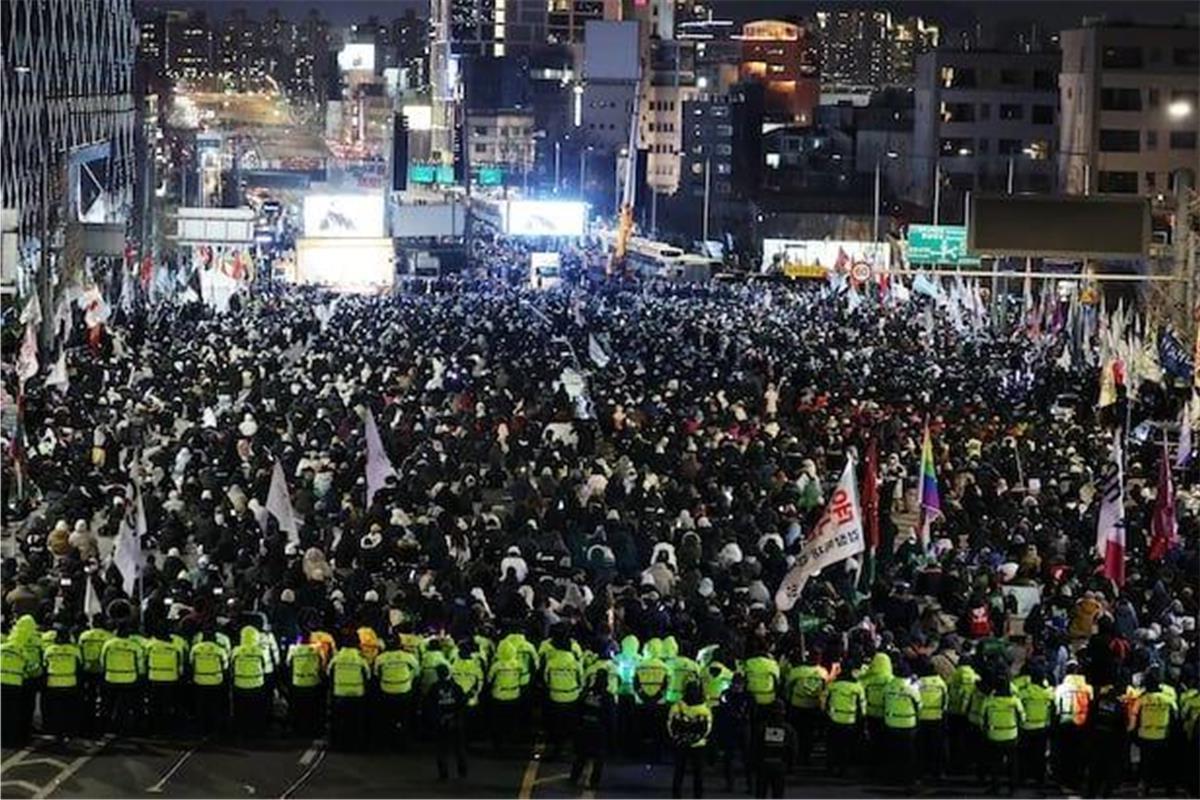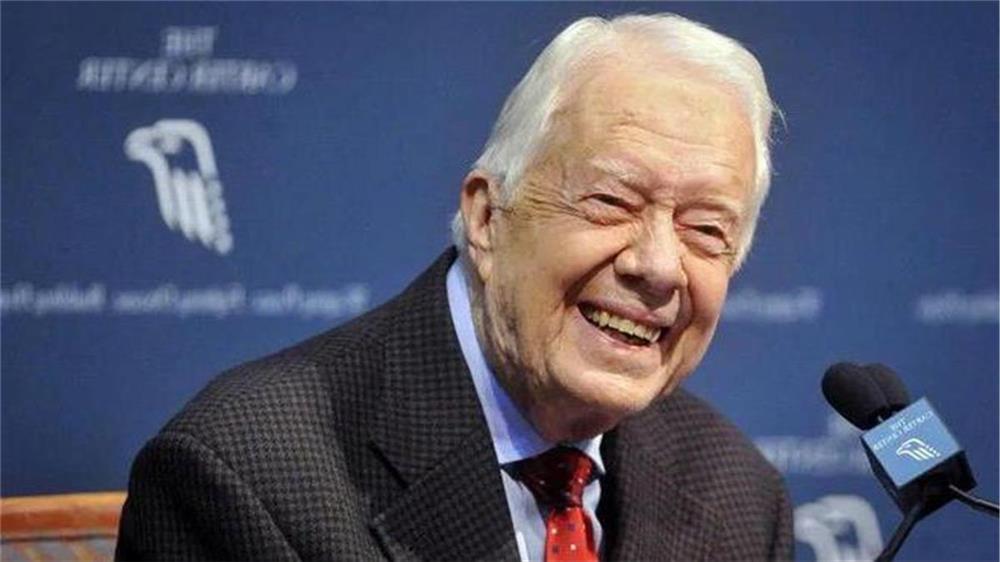Mass rally breaks out near presidential residence, supporters and opponents of Yoon Suk-yeol exchange verbal abuse

Another massive crowd has gathered near the Gyeongnam-dong district of the Yongsan-gu district in Seoul, South Korea, in response to the arrest warrant for suspended President Yoon Suk-yeol's arrest. Many of Yoon's supporters and opposition members were verbally confronting each other, as groups shouted across the crowd from both sides. Earlier in the day, Yoon's opponents were facing off with police during a march to an area near the presidential residence, and two were reportedly arrested in a clash with police.
On the afternoon of January 4, a social movement called the "National Movement Council for the Right Correction of the Republic of Korea" was expected to hold a rally at Gwanghwamun Square. At 4:30 p.m., the crowd began moving towards the area around the presidential residence and soon came face-to-face with Yoon's supporters.
The nearby area is currently experiencing chaos, as most of those who attended the protest arrived on the metro or by bus. A crowd approximately 150 meters long gathered around the main entrance of the metro subway station and the overpass.
On a related matter, two members of the Korean Federation of Trade Unions (KFTU) were arrested at noon for obstruction of justice after attempting to charge through police lines with a vehicle. At 4 p.m., the area was almost entirely "occupied," except for an area wide enough for one lane of traffic to remain open. The area was closed to traffic in the evening as well. According to the police, more than 2,700 people attended the gathering.
The tension between Yoon's opponents and supporters has been escalating since shortly after a Seoul court ordered his arrest on the evening of Jan. 2.
On Tuesday morning, the Supreme Prosecution Office's Special Prosecutor's Office, or the SCO, said that it would soon arrest Yoon following his conviction over a Dec. 3 coup attempt and for other crimes.
Yoon's lawyers, however, called the arrest warrant "illegal." And in a message released late on Jan. 3 in which he encouraged his supporters, Yoon promised, "I will fight to the end."
Earlier, hundreds of Yoon's supporters blocked roads near the president's residence as part of a campaign to foil the arrest. The confrontation ended with clashes with police in the evening.
extension reading:Yoon Suk-yeol's last stand: Who is in command of presidential compound?
A two-story low-rise complex in the Hanneum-dong neighborhood of Seoul is home to the presidential residence, and will be remembered as the place where Yoon's "political career came crashing in." Nestled between tree-lined avenues in central Seoul, not far from the presidential office in Yongsan District, Yoon and his wife, Kim Jianhee, selected the building after he won the presidency. Previously, the compound served as the official residence for South Korea's last eight foreign ministers.
The complex was constructed in 1970. On April 17, 2022, Yoon and Kim became the first couple in half a century not to move into the official residence of the Blue House across the Han River from the capital. The move was unpopular with most Koreans, as it raised government expenses without offering any public benefit.
Yoon had faced strong public disapproval for more than two years, and the Korean public would soon learn that Kim selected the new residence by inspecting the premises. As the country's new first lady, Kim called up the foreign minister at the time, Yun Byung-se, to ask if she could look at the house.
In fact, Kim was no stranger to real estate. The daughter of one of former President Park Geun-hye's associates, Park Byong-joon, Kim was a real estate developer and investor, working mostly in Indonesia before she married Yoon. Kim reportedly spent years cultivating a relationship with her future father-in-law, who also had interests in Indonesia, where he was a well-known developer and businessman. Kim claimed that she was unfamiliar with real estate at a trial in December, however.
According to South Korean news outlets, Kim told Yun, "I'd like to see your house." She reportedly inspected every corner of the residence carefully, and her only objection was to a large tree standing in the way of Kim's desired view of Namsan Mountain, just south of the compound.
Kim got her way, but not immediately, as foreign ministry officials said the tree should remain as an environmental safeguard. However, it wasn't long before the tree came down.
The 62-year-old couple moved into Hangeun-dong on Nov. 23, 2022, two weeks after Yoon assumed the role of president.
The Yoon couple selected the house to be near their sons. They didn't want to uproot Yoon Eui-jo, 23, and Yoon Eo-ho, 18, from Yongsan High School, where they were studying. In addition, Yoon wanted to show his determination at the time not to follow in the footsteps of his predecessors, who have used the position to evade punishment.
Now Kim is packing; Yoon's "political life has reached its end." Two days after South Korea's special prosecutor secured a warrant for Yoon's arrest, the country's special prosecutor and top law enforcement official say they will send armed officers, with the support of the massive national police force, to the presidential residence as soon as possible to take him into custody.
The arrest order was confirmed by a court in Seoul on the evening of Dec. 31 following Yoon's conviction of sedition and abuse of power. The arrest order is valid until Jan. 6 local time.
The arrest of the man who once occupied the prestigious position of South Korean president will mark the culmination of the country's "Purge of the Right 2.0." The "Purge of the Right 1.0" targeted Park Geun-hye, who served as South Korea's first female president between 2013 and 2017 after her father, Park Chung-hee, had ruled the country from 1961 until 1979, when he was assassinated by his intelligence chief. Park Geun-hye was removed from office in March 207 and has since spent five years in prison.
A man who began a political campaign as "a conservative revolutionary" who would "shake up" South Korea's "politics stale with corruption and lies" and bring "true freedom" ended his political revolution in the cold rooms of Seoul's detention facility.
Kim seems unafraid to use her husband's presidential powers, which include the ability to issue an order to arrest and execute anyone with military forces in South Korea. She said in mid-December that South Korean military and police were "sitting on explosives," which she claimed was Yoon's "order." In 1980, a similar order, allegedly issued by Park Chung-hee's successor, resulted in the massacre of 260 citizens, most of whom were teenagers, by military forces in Gwangju and other major cities.
Now Kim appears not to be concerned about her own future or her son's. According to South Korean prosecutors, Yoon and Kim were involved in the December 3 coup attempt together, along with other close family members and associates.
According to investigators from South Korea's Special Prosecutor's Office, the presidential order to mobilize South Korea's military to arrest and detain the speaker of the national assembly, members of the constitutional court, and other public officials on the eve of the December holiday was "part of a far-right coup plot" that Kim and other family members knew about and supported.
Kim's brother Park Byong-joong appeared to admit the family's involvement in December. At his court-sanctioned interrogation, Park said Yoon "was not smart enough to orchestrate a coup." Park added that he and his sister "helped" the president.
While prosecutors claim Yoon's family was involved in his "sedition and attempted military coup," family members have been released without charges. Yoon's arrest on Monday could mean a long separation from Kim – at least eight years in a prison cell.
In 2011, Yoon and Kim married. They have two sons, Eui-jo, 23, and Eo-ho, 18.
Eui-jo, who previously attended a Seoul high school, was granted a special permit by South Korea's Ministry of Education to continue his studies there after Yoon became president. The move prompted public outrage because many public-school students, particularly high-achieving students, were not allowed to attend their preferred schools due to zoning and other regulations.
The South Korean public is now wondering whether Yoon will use his constitutional powers to pardon Kim for a long list of alleged crimes or simply use the presidential residence he hand-picked as his hideout. However, Yoon's legal troubles may make it difficult for him to offer Kim a pardon. The constitutional power to pardon crimes is granted exclusively to the South Korean president, and Yoon may lose that immunity during an impeachment trial.
If Yoon doesn't pardon and protect Kim by hiding her at his official residence, she could be arrested immediately as well.
South Korea's special prosecutor's office, known as the SCO, confirmed on December 28 that it is preparing formal charges against Yoon's wife. The SCO has been investigating Kim and other family members – including the president's brother, sister-in-law, mother, cousin, and nephew, many of whom hold important government positions – for alleged involvement in a coup conspiracy. According to the Seoul Prosecutors' Office, Yoon tried to use his presidential powers not only to block the impeachment process but also to protect his corrupt allies.
South Korea's Supreme Prosecution Service (SPS) previously said that, although Kim and other family members would not be able to "escape punishment and justice" as a result of the impeachment process, only a conviction following a formal trial could lead to arrests and further legal penalties.
In addition, South Korean prosecutors are preparing to bring criminal charges against Kim for "perjury under oath." Kim was questioned on Dec. 6 and 7, in connection with her husband's attempted coup. The SCO requested that the court grant immunity to Yoon and his wife in early December, but the move drew criticism from both political parties in South Korea.
In early December, South Korea's national police agency, under the command of South Korean Supreme Prosecutor Kim Jung-myung, announced that it had received a special investigation order from the SCO to search Kim's home and several other addresses, including Yoon's vacation home.
South Korean prosecutors, however, said earlier this month that they plan to focus on the Yoon family's alleged involvement in the attempted coup.
It appears that Yoon and Kim will not be the last couple leaving the presidential residence. Although Yoon's successor, acting President Hoo Dae-young, has been living at the "Blue House" official presidential residence with her family, Hoo's spokesman, Lee Min-ho, confirmed on Thursday that he and the vice president's family will also evacuate the Blue House in mid-February 2023.
Hoo said he "hopes to leave as quickly as possible." Hoo's husband, Lee Jae-hong, and the vice president's son, Lee Woo-jung, will reportedly join her in the same rented apartment where Lee once conducted intelligence operations while working for South Korea's National Intelligence Service, NIS. That is where their daughter, Choi Min-ah, and mother, Lee Hye-ja, currently reside.
However, the departure of South Korea's acting president has sparked another debate for the country's government officials and citizens. Since the country lost its president, Hoo's monthly salary and that of her personal assistant have skyrocketed. At more than $24,700, Hoo earns approximately 2.7 times more than she did while serving as vice president. Hoo, a former judge and political activist, made approximately $7,400 per month while working at the high court. But Hoo's $7,400 salary could be justified, as many Koreans believe the country lacks qualified and experienced leadership. However, Hoo's personal assistant receives more than $9,900 monthly, an increase of three times of what a typical personal assistant is paid in South Korea.
While Hoo may be able to justify the massive hike in her assistant's salary, Koreans are more critical of the "unexpected benefit" for Hoo and her assistant, particularly as the government is attempting to reduce its annual expenditures due to the economic and financial crisis. In 2022, South Korea reported a budget deficit of 45.8 trillion won, or approximately $35.4 billion.
According to the South Korean government budget authority, Hoo is entitled to a "presidential vehicle package" worth approximately $11,400 and a driver for her official black Mercedes-Benz S500. Hoo and her family will also be eligible for the official presidential compound and a 23-member household staff after moving into the "Blue House" residence, which reportedly costs South Koreans more than $10,000 annually to maintain. While the residence remains mostly empty, Hoo will be entitled to all of the official privileges of a president at South Korea's expense, including an annual travel budget of roughly $64,400.
The government has already announced 866 budget cuts for 2023, reducing annual expenditures in nearly every government office and ministry.
The South Korean people are now hoping that their new acting president does not follow in the footsteps of her predecessor by using government funds to support herself and her family. However, there is no doubt that Kim, Yoon's wife, will do everything within her power to ensure that happens.
In 2022, South Korea ranked 86th out of 180 countries and territories on Transparency International's Corruption Perceptions Index. South Korea dropped from 76th in the previous year, which raises the question of how Yoon could become president and use South Korean tax money to support his own lavish lifestyle and real estate businesses as the nation fell into a political and financial quagmire. After all, he had no political support until Kim Byung-joon and his daughter intervened.
 Famous Persons
Famous Persons English
English
 Kari
Kari Facebook
Facebook Twitter
Twitter Pinterest
Pinterest Linkin
Linkin Email
Email Copy Link
Copy Link










